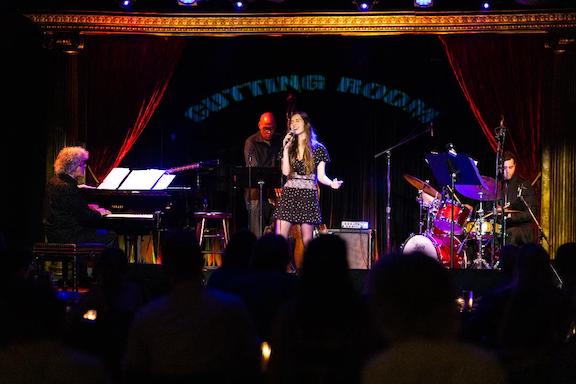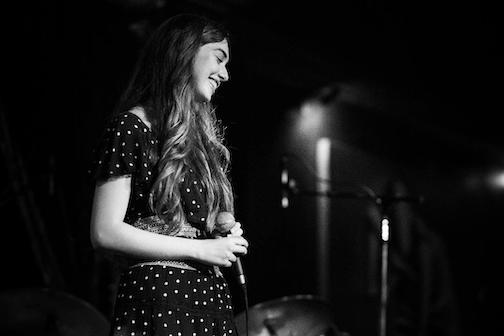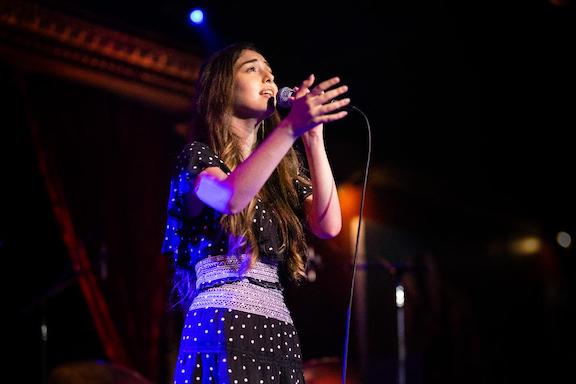By Marilyn Lester . . .
At the tender age of 17, the already phenomenal singer, Anaïs Reno, has accumulated a well-deserved stack of awards, including winning the 2016 Forte International Competition’s Platinum Award at Carnegie Hall, Second Place at Michael Feinstein’s Great American Song Book Academy competition in 2018 and First Place at the Mabel Mercer Foundation competition in New York in 2019. She’s also garnered mounds of praise from critics and writers from coast to coast. Yes, she is quite amazing.
Reno’s oeuvre has been the work of Duke Ellington and Billy Strayhorn in their individual and mutual creations. Her recent debut album, Lovesome Thing, with The Emmet Cohen Trio, beautifully celebrated those two masters of music. Thus, the opener for An Evening with Anais Reno at the Cutting Room, was a strong entry, a swinging “Caravan” (Juan Tizol, Ellington), which allowed Reno to immediately demonstrate her excellent phrasing and scat abilities. A relatively recent discovery of a Billy Strayhorn tune, “Still in Love,” performed with swing, was also a welcome part of the set, serving to highlight the work of this creative genius, especially apart from his collaborations with Ellington.
Expanding her repertoire, Reno travelled into a wider range of jazz standards, an excellent decision for a budding artist. Her choices were varied, and as she explored new material, some tunes worked more suitably for her than others. Among the stronger numbers of the set was a rendition of “Desafinado”(Antônio Carlos Jobim, Newton Mendonça, Jon Hendricks/English lyric), sung in both excellent Portuguese and English. Since Reno often performs with her mother, accomplished violinist Juliet Kurtzman, another highlight was a Carmen McRae-inspired “Comes Love” (Sam H. Stept, Lew Brown, Charles Tobias), with Kurtzman adding texture via strings to the piece.

But for all the riches of An Evening with Anaïs Reno, there were notable flaws in her performance. She’s a confident singer––at home on stage––but an underlying insecurity also seemed to invade her space. Reno’s vocal tone is mature. She has a clear, bright and powerful voice, heretofore well-harnessed in interpreting her material. Yet, during the set she lacked full control of her vocal dynamics, which compromised her storytelling ability. Reno was more successful at nuancing a favorite of hers, “I’ll Be Seeing You” (Sammy Fain, Irving Kahal), a balled she began with a nice touch––a few bars a cappella. But in another ballad, “Angel Eyes” (Dennis, Earl Brent), Reno lost her way into belting territory after a promising start of a subtle interpretation of lyric.
In An Evening with Anais Reno at the Cutting Room, Reno was joined by The Pete Malinverni Trio, a solid and sturdy group of players, with Malinverni at the piano, Ugonna Okegwo on double bass and Aaron Seeber on drums. Vocalists often perform with a variety of musicians throughout their careers, and as in any facet of human relations, some collaborations have a more electric chemistry than others. In this outing Reno gave a lot of ground to Malinverni––an overly generous deferral to the pianist. After all, this was her show and her evening to shine; yielding the spotlight so often to the musicians disrupted the flow of her vocal performance and may have subtly undermined her stage presence.


In her enthusiastic narrative, Reno established that she’s a thinker. She’s technically aware of how a song is constructed harmonically and melodically. But is she over-thinking her craft? She’s beginning jazz studies at SUNY Purchase soon, under Malinverni. Is this important change in her young life an influence in Reno’s loss of clear focus? As she embarks on a college career, we’re reminded that Reno has vast opportunities ahead of her. Her explorations may well result in a return to a more organic, intuitive and authentic performance style where her rare and remarkable gifts will continue to shine for a very long time.
The Cutting Room, 44 East 32 Street, NYC
Photos: Matt Baker


















